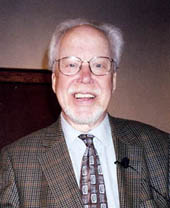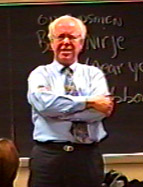Moments in Disability History 15
Towards Independence: Powerful Words
Two papers with nearly identical titles, written more than 15 years apart in different parts of the world, fueled a new era in disability politics focused not only on changing social attitudes towards people with disabilities but also on creating new rights.
In 1969, Dr. Bengt Nirje, Director of what is now the Swedish National Association for Persons with Intellectual Disability, delivered a paper entitled "Towards Independence" at the 11th World Congress of the International Society for Rehabilitation of the Disabled in Dublin, Ireland. "Towards Independence" chronicled developments in the self-advocacy movement in Sweden and spurred worldwide new social policy based on the normalization principle and "dignity of risk".
When Dr. Nirje translated the normalization principle into English and published the concept in the 1969 President's Report, it had a tremendous impact on American professionals. Dr. Wolf Wolfensberger at Syracuse University introduced the practice of normalization to the United States in the 1970s.
Dr. Bengt Nirje developed the normalization principle in the 1960s. The principle reflects the regular rhythm of the day and the regular routine of life. It's useful with all age groups, and adaptable to social changes and individual development. It means that the choices, wishes, and desires of the individual are considered and respected.

Dr. Bengt Nirje
In 1983, he created social role valorization (SRV), a later generation of normalization, that promoted the importance of socially valued roles for people with disabilities. Through SRV, Dr. Wolfensberger described the role perceptions of people with disabilities and how words and images used in describing people with disabilities resulted in the suppression of legal, civil and human rights.
A subsequent series of reports in the 1970s from the Center for Human Policy at Syracuse University advanced normalization and self-advocacy. In 1976, the Center published a report on the theory and practice of "handicapism", calling it a concept similar to racism and sexism. The report described how "handicapism" promoted myth, prejudice and stereotyping of people with disabilities.
In 1979, under the leadership of the late Burton Blatt, the Center released a followup to this report entitled The Community Imperative: A refutation of all arguments in support of institutionalizing anybody because of a developmental disability. The Community Imperative declared that all people have fundamental moral and constitutional rights, and that these rights must not be abrogated merely because a person has a disability. The Community Imperative is available for review.
In "Towards Independence," the NCD identified, for the United States Congress, the discrimination in public policy that was experienced by people with disabilities. Less than 2 years later, in January 1987, the Minnesota Governor's Council on Developmental Disabilities published A New Way Of Thinking, a monograph that articulated a new way of thinking about public policy and people with disabilities: people living in real homes, learning in regular schools and working in real jobs. This "new way of thinking" encouraged exploring new service strategies.
But, as Madeleine Will, herself a parent and at that time Assistant Secretary of the Office of Special Education and Rehabilitative Services, summarized, the new policies and services had not yet tipped the balance. In 1984, in words anticipating the Americans with Disabilities Act, she said, "Citizens with developmental disabilities want the same opportunities and ought to have the same opportunities as other members of the community – not because it is cost effective, even though it is, and not because it is prudent, even though it is. They should have the same opportunities because they deserve it."
The video A New Way Of Thinking, sent the message that people with disabilities "have the right to live, to work and… to know the dignity to which every human being is entitled."
The words of Bengt Nirje and the NCD were a powerful influence on American public policy. Nirje's "Towards Independence" in 1969 and the NCD's "Toward Independence"" in 1985, fostered by years of work by disability activists, supporters, and concerned citizens referred to as "a hidden army for civil rights" by Joe Shapiro, led to the writing of the Americans with Disabilities Act in 1990.
Please Note: The language and terminology that appear throughout this month's episode were not only considered acceptable at the time but have their origins in another country. These resources are also historical, and the language and terminology used is retained due to the historical context as well.
Sources:
VII. The Self-Advocacy Movement 1980s Present: B. Origins of the Self-Advocacy Movement
The Development of Supports for Having A Home In The Community: Handicapism






